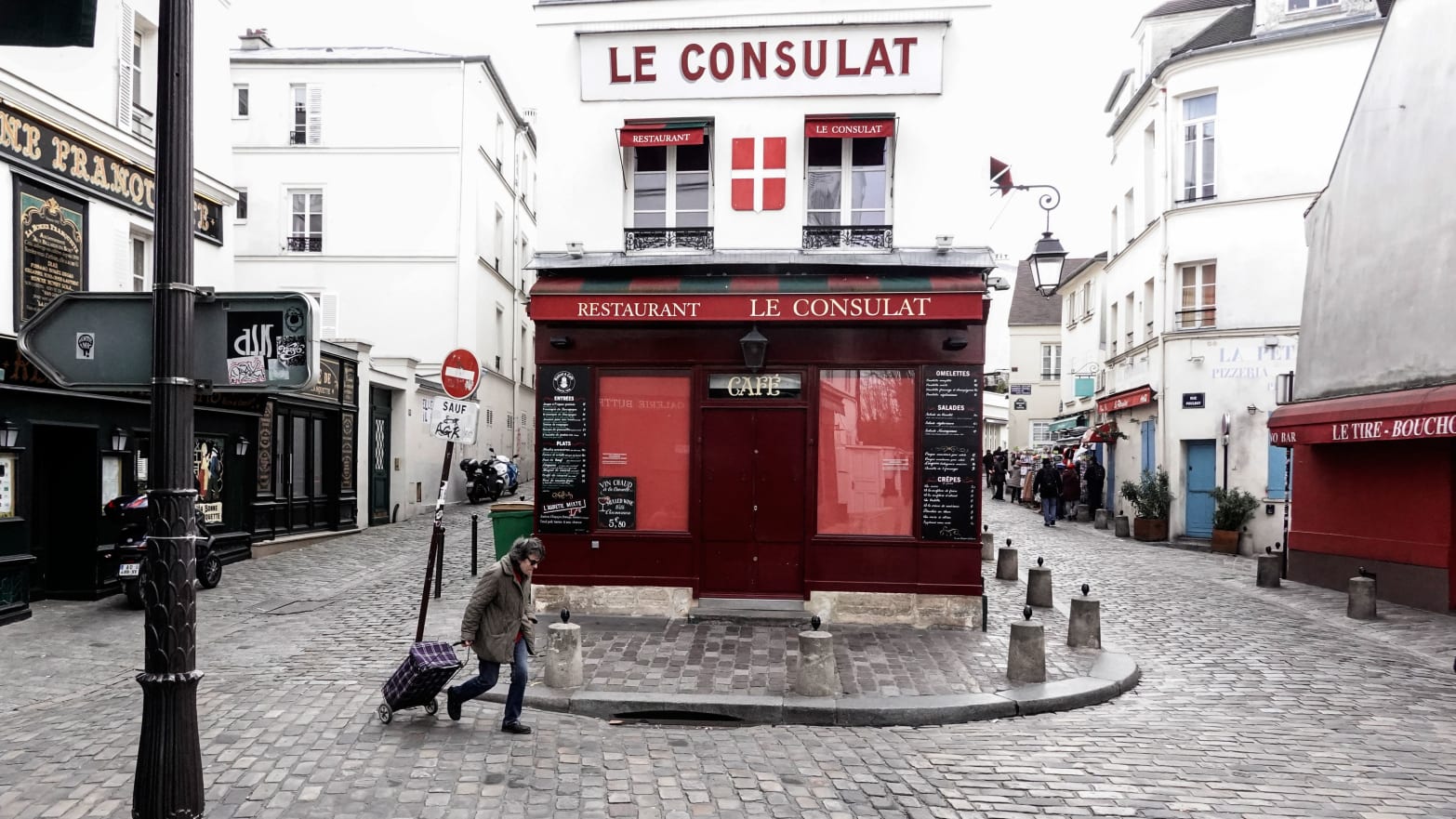UPDATE: As of Monday, Germany joined the list of European Union countries reinstating border controls. The impact may be dramatic, effectively ending free movement within the Schengen Area, since Germany is right in the center. Its borders with France, Austria, Switzerland, Luxembourg, and Denmark were partially closed as of 8:00 a.m. Central European Time.
German Chancellor Angela Merkel said as recently as Wednesday that EU countries “should not be isolating ourselves from one another” and must adopt a “unified approach that is, as far as possible, coordinated." But on Sunday, German Interior Minister Horst Seehofer said the government needed to “disrupt the chains of infection," and to do that it must “limit not only large events and social contact, but also the movement of people.”
PARIS—The sad, shuttered cafés of Paris are just the latest symptom of the coronavirus pandemic here in Europe, which is now more than a health crisis and an economic crisis. It is changing traditional ways of life even as the fear that surrounds it threatens values and institutions. Whether these developments are transitory or the shape of things to come is for now, like so much else associated with COVID-19, an open question.
In a separate story, The Daily Beast’s Barbie Latza Nadeau tells us what it’s like to live, and die, in locked-down Rome. Yesterday, Jamie Ross wrote about the phenomenally dangerous gamble of the Brexit British government, which has been encouraging the spread of the virus on the quasi-scientific hunch that such a policy will build up “herd immunity,” even as it kills off the old and infirm.
Over the last few hours, the gravity of the situation and the threat it poses to the unity of the European Union have become clear as Poland, the Czech Republic, Slovakia, and Denmark have, to varying degrees, shut their borders.
What follow are accounts of the specific situation in Denmark, a member of the European Union and the Schengen Area of open borders, that is now attempting to seal its frontiers while giving the government the power to seize private property. And Spain, where only a week ago the government was encouraging millions of people to gather in the streets to mark International Women’s Day, but now is shutting down the country, with a growing number of top government officials and those close to them testing positive for the virus.
Finally, we’ll come back to France, where President Emmanuel Macron has projected a solid image of commitment and control–while pursuing contradictory and sometimes confusing policies.
SOMETHING ROTTEN
Daily Beast contributor Florian Elabdi reports that at the week’s end the coronavirus was spreading faster in Denmark than any place in Europe, and the Danish government implemented the most severe restrictions on its citizens since World War II, curbing some fundamental freedoms of democracy. Many political experts are worried, but most Danes support the government.
Only seven hours after the president of the European Commission, Ursula von der Leyen, warned member states against closing their borders to curb the spread of the coronavirus, Danish Prime Minister Mette Frederiksen did just that.
Starting on Saturday, the Danish government closed all its borders and prohibited its citizens from leaving the country unless absolutely necessary. Foreigners will not be allowed to enter Denmark, unless they have a “worthy” reason. The prime minister further called on all Danish citizens around the world to return home immediately, creating panic among many of the 100,000 Danes abroad.
The coronavirus disease, COVID-19 killed its first Danish victim on Saturday, an 81-year old pensioner. Since March 2, coronavirus infections in Denmark have soared from four confirmed cases to 827 as of March 14, which made the Scandinavian welfare state the country in Europe where the pandemic is spreading at the fastest pace, according to Danish Health Minister Magnus Heunicke.
But severe restrictions on traveling are not the only extreme measures taken by Danish authorities. Parliament passed a series of emergency laws giving authorities the right to expropriate citizens’ private property and suspending freedom of assembly. Gatherings of more than 100 persons, including protests, are forbidden. Already on Thursday all public schools and public workplaces were closed for two weeks.
Further, the new laws give authorities the right to force people “suspected of carrying a disease” into treatment and vaccination, making it a breach of the law to resist being tested for the virus.
Another controversial proposal, which would have given the police the right to search people's property without a warrant, was removed from the bill after opposition from the Red-Green Alliance and the Social Liberal Party.
Political observers have said that under normal circumstances these measures would be a grave violation of Denmark’s constitution and basic democratic rights, but maintain that the current emergency situation justifies many of the encroachments on our freedoms.
“These are very far-reaching laws, but this is an emergency situation and for that reason it is presumably legitimate,” Danish political commentator Anne Sofie Allarp told The Daily Beast, noting that the laws are due to expire a year from now.
Still, she fears that it is a slippery slope in a political climate where shifting Danish governments have for years attempted to restrain personal freedoms.
“We have a fundamental right in Denmark to refuse treatment, we have autonomy over our own body and now this is suspended,” Allarp said. “This is an emergency situation, so I think most people support it, but it comes at a time where personal freedoms are already under pressure from the state.” In recent years Danes have been subjected to increased surveillance and a number of controversial laws targeting citizens in government-defined “ghetto areas.”
Prominent Danish political analyst Lars Trier Mogensen goes even further, suggesting these measures give the government “draconian authority”.
“Many of the most basic freedoms of our democracy and constitution have now been temporarily suspended and the military has been deployed to close our borders, already turning away German citizens. This has never happened before in peacetime. It’s a militarization of our society,” Mogensen told The Daily Beast.
“It is extremely drastic to limit some of our most fundamental freedoms such as our right to demonstrate and the sanctity of private property,” he said, expressing concern that the government may exploit this opportunity to keep certain restrictions in place, even after the laws’ natural expiration next year.
Saturday, further questions were raised about the government’s decision to close the borders, when the executive director of the Danish Health Authority, Søren Brostrøm—perceived by many as Denmark’s official spokesman during the crisis—stated bluntly that the government’s decision to close the borders was a political decision, not a scientific one.
For years, it has been a cornerstone of Danish right wing parties’ political agenda to increase border control and seal the border off completely at times. The left wing government of Mette Frederiksen has been criticized for adapting key right wing policies such as border control to capture voters from the anti-immigration Danish People’s Party.
This is not the first time that Denmark has received international attention for its handling of the corona pandemic.
Earlier this month, the government asked mayors to stop citizenship ceremonies because a mandatory handshake is required—a regulation targeting some Muslims reluctant to shake hands with the opposite gender. Since handshakes are now to be avoided according to health authorities, thus immigrants of all beliefs will have to wait for naturalization for an uncertain amount of time.
Moreover, several parliament members of the populist Danish People’s Party have none too subtly blamed immigrants for the spread of the disease, suggesting all asylum seekers should be detained to stop the spread. This despite the well-established fact that the virus was brought to Denmark by well-to-do Danish vacationers coming back from skiing trips in Austria and Italy over the holidays.
Denmark’s Scandinavian neighbor, Sweden, has been highly critical of the effort to seal off the country. Its state epidemiologist Anders Tegnell calling the Danish move “completely meaningless.”
Sweden has taken an approach almost diametrically opposite Denmark’s. Schools and workplaces are still open and the wheels of society keep turning almost as if nothing is happening. The most severe restriction so far has been to cancel all events with more than 500 participants.
“Either Swedish authorities are underestimating the situation and risk unnecessary deaths, or else Mette Frederiksen is overreacting, risking extensive economical damage to no avail,” one Danish daily wrote in a front page editorial Saturday.
“The significant difference between Denmark’s and Sweden’s approach reflects the different political cultures,” Lars Trier Mogensen told The Daily Beast. “In Denmark we tend to believe that we can isolate ourselves from the outside world to keep out a pandemic, Sweden is a much more internationalized society, accepting that global problems have to be dealt with differently. But with regards to what is most effective approach to disease control, time will show which of the two countries were right.”
THE NEW ‘SPANISH FLU’
The latest news out of Spain is that the wife of Prime Minister Pedro Sánchez has tested positive for the novel coronavirus. The wife of his number two has tested positive as well, meaning the most powerful figures in the Spanish government should go into quarantine—although it’s not clear they are actually following the rules.
But that is an easy headline compared to the deeper institutional maladies of the country’s government, which became all too apparent as it tried to ignore, then scramble to address, the novel coronavirus threat to the population.
After furious fighting within the cabinet, which is less a team of rivals than a coalition of outright enemies, a “state of alert” finally was declared on Saturday. It is due to last more than two weeks, and gives the government the power to confine people and order evacuations. The military has been called out as well. Bars, restaurants, and nightclubs are shut down in and around Madrid. Schools and some other public spaces had been closed earlier.
Correspondent Itxu Díaz writes that at the end of the week, Spain’s government seemed incapable of taking quick, effective measures in an emergency due to the extreme decentralization of its governmental system; for example, health policies are determined by each of the country’s 17 autonomous communities.
The national “state of alert,” designed for epidemics allows the Madrid government to take charge to try to deal more coherently with the situation. Yet even with almost 200 dead and more than 6,000 infected, the President of Catalonia, Quim Torra, refused to apply the central government’s state of alert, alleging that it is an attempt by Sánchez to nationalize the powers of health, safety and transport with "the excuse” of the coronavirus. Torra also called the president of the Basque Country and obtained his support. In case the situation was not crazy enough, the far-right-wing VOX party offered to lend its votes to the Socialist Sánchez.
With Spain taking over from Italy as a major focus of coronavirus concern in Europe, with health workers taking shifts of up to 24 hours and having to resort to triage to save younger lives while letting the old go, and with a government much criticized this week for its slowness in applying measures against the coronavirus pandemic, the Spanish, who have finally taken the situation seriously and are confined to their homes, are stunned by the political turmoil.
Some political voices from the right and the left have begun to ask for the mediation of the King of Spain. Others already are calling for the formation of a government of national unity bringing together the two major parties of left and right, or a technocratic government.
Finally, Sánchez won over the ministers from the far-left Podemos party as well as the Catalans and Basques, but without reaching agreement on what measures should be taken to support the economy and workers unable to go to their jobs. Those contentious issues have been pushed back to Tuesday.
The alert was activated on Saturday. When the announcement came, the sense among the public was, “Finally, we have a damn plan.” People went out on their balconies to cheer the doctors who have been struggling without sleep to meet the demand for care.
The plan as outlined is much the same as Italy’s a couple of weeks ago and similar to what France put in place on Saturday as well:
1st phase: social distancing, stay at home except to shop for what you need (but hair dressers, clothing, etc. all open).
2nd phase: all stores close but coffee shops, essential (computer, hardware, grocery), and pharmacy.
3rd phase: closure of everything but grocery and pharmacy and factories, some hardware and computer stores open on limited hours.
4th phase: factories close, public transportation stops—this is where we are today in Spain.
5th phase? God only knows.
FRENCH DISCONNECTIONS
The most famous avenue in Paris, the Champs-Élysées, was not empty on Sunday. Hundreds of people were out strolling on a beautiful, breezy spring morning. But all the famous stores—Cartier, Louis Vuitton, and so on—were closed, and so were the trademark sidewalk cafés like Fouquet’s. Even MacDonald’s was locked up tight, with hastily printed pieces of paper in the windows that announced, in English, “The government request to close until further notice.” Like all the rest of the restaurants and bars in France, they places got only a few hours’ notice before the decree closing them went into effect.
Yet, for the moment, even these drastic measures strike many in the French capital as more of an inconvenience than a sign of impending and extreme difficulties. Prime Minister Édouard Philippe, announcing the most recent closures, betrayed some impatience with the French who had largely ignored people earlier measures to limit the size of public gatherings. People, he said, “must change their behavior.” (A revealing article in Le Monde reported at length on young people in the hip quartiers of Paris partying on Saturday night like there was no tomorrow, while banking on the fact that COVID-19 mainly kills people much older than they.) On Sunday, rumors circulated that the government would take still more drastic measures on Tuesday.
Tourists Olivia Lipton, 26, and Maciej Naworski, 33, had just popped over from London this weekend on the almost empty Eurostar and discovered there wasn’t much to do aside from riding electric scooters around town to see the sights. But Lipton, a civil servant, also was disturbed by British “herd immunity” policy based on the idea that 60 percent of the population will be infected and should be as soon as possible, a critical mass needed to protect society, theoretically, in the long run. “It’s frightening,” she said.
Meanwhile, France went ahead with nationwide municipal elections which, for reasons not entirely clear, the Macron government declined to postpone. Turnout was low, lines were short, and at the polling places visited by The Daily Beast, voters were quite conscious of social distancing. So the epidemiological impact might be limited. But the political message struck many people as incongruous, keeping the polls open on a day when so much else in the country was shut down.
Macron told the nation on Thursday that his government would meet the demands of the pandemic “whatever the cost,” yet one of the most critical needs—widespread testing—has lagged way behind other countries, including Italy, Germany, and especially South Korea, where massive testing focused on people believed to have come in contact with coronavirus carriers appears to have helped stanch the spread of the disease. Already the vaunted French medical system appears to be under strain, and that does not bode well if the progression of the disease in France is similar to that in Italy.
Macron was asked after he left a polling station Sunday morning if he had been tested, and he said no. He has no symptoms, he said, and therefore no need for a test. Only people with symptoms should be tested, he said, so as not to put too great a strain on resources.
But, as many experts have said, that may be too late to avoid infecting other people.



